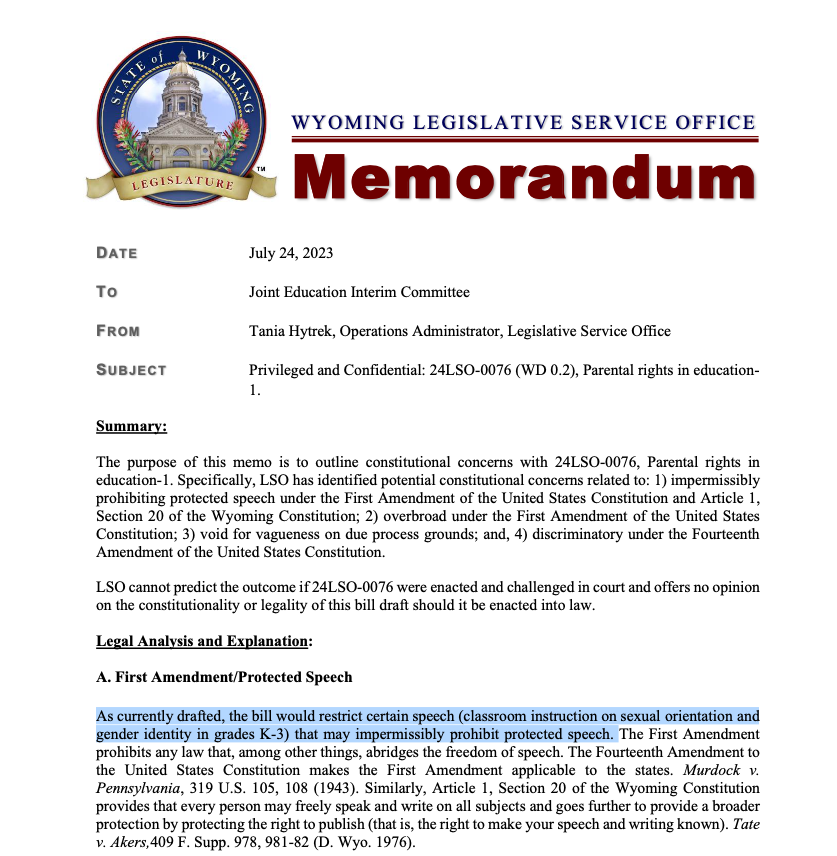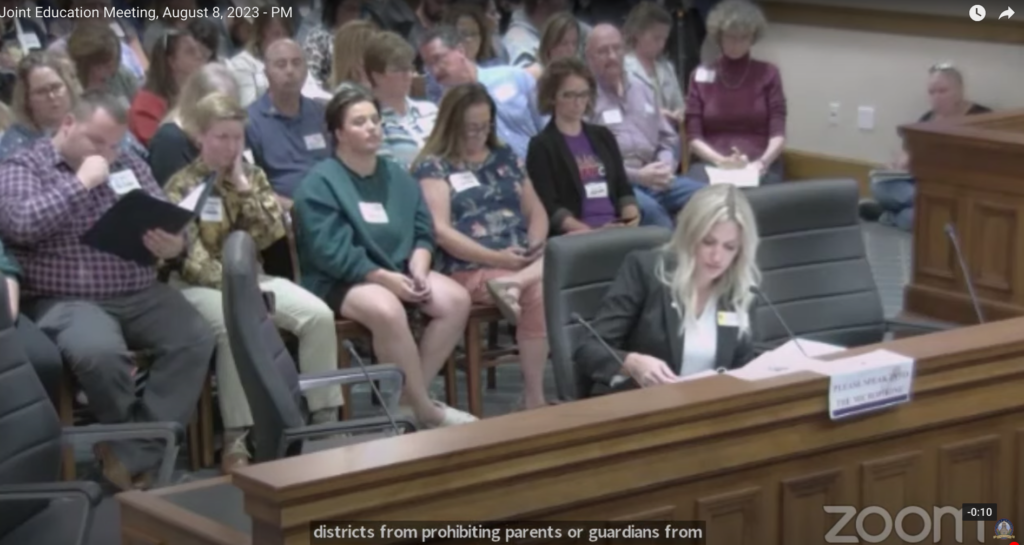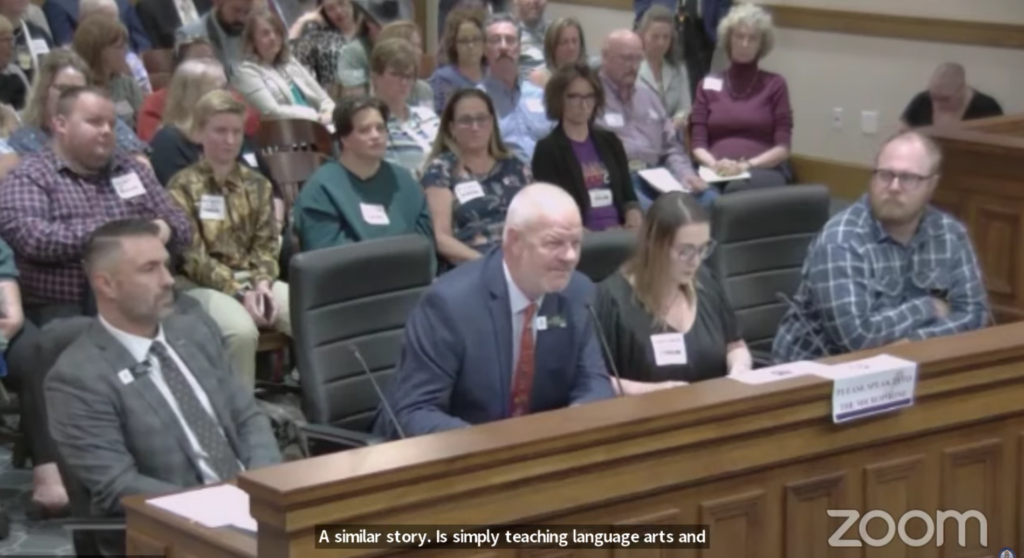Wyoming ‘Don’t Say Gay’ Bill Could Have ‘Chilling Effect’ on Classroom Discussion
Parental rights law under consideration would ‘prohibit classroom discussion about sexual orientation or gender identity’ in grades K-3
- Published In: Politics
- Last Updated: Aug 09, 2023

Senator Bo Biteman (R-Ranchester) speaks on Jan. 18, 2023 in the Senate Chamber. Biteman brought forward discussion on the draft legislation called “Parental rights in education-1,” which he said he supports. (Photo by Michael Smith)

By Carrie Haderlie
Special to the Wyoming Truth
When Grady Hutcherson, now president of the Wyoming Education Association, was a second grade teacher in Goshen County, a student he called “Frank” brought a doll to class every day.
That boy, Hutcherson said, played with female students — and his doll — every day.
“I didn’t care that he brought that doll,” said Hutcherson, who spoke at a Joint Education Committee meeting in Cheyenne Tuesday. “I cared about his safety, and him not being bullied by other people. That was my concern.”
However, proposed legislation under consideration by the Joint Education Committee would have a “chilling effect” on Hutcherson’s ability to protect that child, he said.
If passed in 2024, the draft legislation considered Tuesday called “Parental rights in education-1” would prohibit “classroom discussion about sexual orientation or gender identity.” The draft legislation also contains parental notification requirements and complaint procedure processes.
“Based on this bill, I don’t understand if I would be able … to provide instruction to my entire class that it is OK for Frank to play with dolls, or females, or not,” Hutcherson, who taught for 24 years, said. “I am asking all of you to answer the question: ‘Would I be able to have that discussion with my class about Frank and the doll?’”
Sen. Bo Biteman (R-Ranchester) brought the bill to the committee, saying it mirrors legislation that passed the Senate last session. That previous bill failed because it was not introduced in the House.

“I would just suggest that it depends on, is it age appropriate? What are you going to explain to the kids and Frank about the doll? Is it just that Frank likes this doll and that’s OK?” Biteman said. “That is not a problem.”
Biteman said the bill addresses a much deeper issue delving “into gender identity politics.”
“This bill is aimed at stopping discussion happening in kindergarten through third grade,” Biteman said. “These kids can’t even wrap their heads around what the heck you are talking about. It prevents some teacher, who is a very big time activist, say, from going on a diatribe for 10 minutes about whatever issue they want to talk about using that as an opening.”
According to a memo to the Joint Education Committee from Tania Hytrek, operations administrator for the state’s Legislative Service Office (LSO), there are “several constitutional concerns with the proposed legislation.”
Hytrek clarified that the LSO does not take a policy stance, but that it is her office’s job to “advise on potential future issues.” In its memo, the LSO identified potential constitutional concerns related to protected speech under the First Amendment, among others.
“There is some precedent that, in the event that you are chilling the environment that students are being educated in, or chilling the environment that teachers are educating, that that is a violation of the students’ First Amendment rights,” Hytrek said. “There are lots of cases that discuss that you don’t shed your First Amendment rights as soon as you enter a school building, whether you are a teacher or a student.”

A ‘Don’t Say Gay’ law in Wyoming?
Marcie Kindred, a woman who identified herself as a mother and founding member of Wyoming Family Alliance for Freedom, said the bill is a carbon copy of Florida’s “Don’t Say Gay” law. She spoke against the bill, and during around three hours of public comment, supporters and opponents of the legislation addressed the committee.
Ryan McKenzie, who identified himself as a Wyoming teacher, spoke against the legislation, saying it takes options away from teachers, parents and educators. It also “fixes a problem that isn’t broken,” he said.
“If a kid comes up to me and he is being bullied because his two dads are gay, for the reading of this bill, I would not be allowed to convene a classroom meeting to solve this problem,” McKenzie said.
McKenzie, who said he is married to a man in the U.S. Air Force, went on to describe a situation that happened to him in May.
“I had a parent out me to one of my kids,” he said. “If a kid comes up to me and they ask me about this situation, would I be allowed to tell the truth? Would I have to say ‘No’ and lie? Or would I be forced to deflect?”
McKenzie said he already refers to his husband as his “spouse” in his classroom because he considers it best practice to separate his personal life from his students. When asked, he acknowledged that his colleagues don’t always do the same, and use the terms “husband” and “wife.”
Nathan Winters, president of the Wyoming Family Alliance, said “the thousands of families that we represent are for this bill.” The Wyoming Family Alliance, according to its website, is a political advocacy partner of Focus on the Family.

Mary Schmidt, a member of the Natrona County School District Board of Trustees, spoke in favor of the bill, saying that her school district was already considering similar rules. Further, she said she has several issues with the constitutional First Amendment concerns outlined in the memo.
“[The memo] gives the example of chilling students, school personnel and others from disclosing their sexual orientation or gender identity, ” Schmidt said. “Why would a teacher or personnel be talking to a child of this age about their sexual orientation? That right there is questionable behavior.”
While opponents of the bill say that it “classifies” people, it actually protects them, she continued.
“The person who spoke about the story of the little boy with the doll. Was he classifying that boy into a transgendered or a homosexual? No, you can’t do that,” Schmidt said. “You have to just say, ‘You can’t bully him because he has a doll.’ This law is stating that you can’t imply the child is any classification. You just have to treat them as they are, at the developmental level they are at.”
The committee voted to split the bill into two parts: One regarding classroom discussion about sexual orientation or gender identity, and the other on parental notification as referenced in the bill text. The committee voted that a new bill draft regarding parental notification will move forward to the November Joint Education Committee meeting.
Rep. Karlee Provenza (D-Laramie) made a motion not to carry the bill text regarding sexual orientation or gender identity to the next meeting. That motion failed in a 7-6 vote.
The committee voted 6-6 not to sponsor the balance of the bill regarding sexual orientation and gender identity. According to committee co-chair Sen. Charles Scott (R-Casper), the bill may come back as legislation put forward by an individual legislator, in which case, Scott said he would support it.













